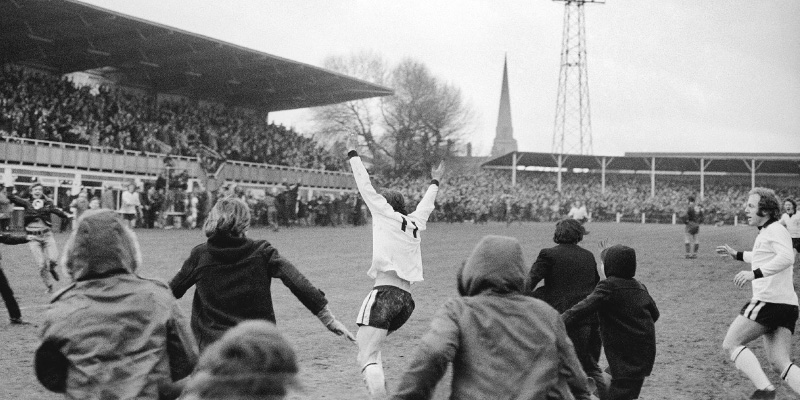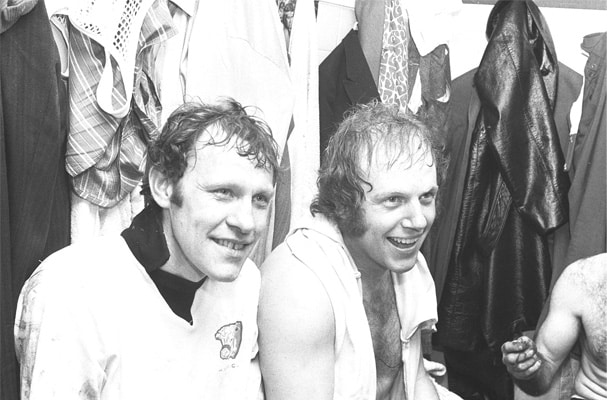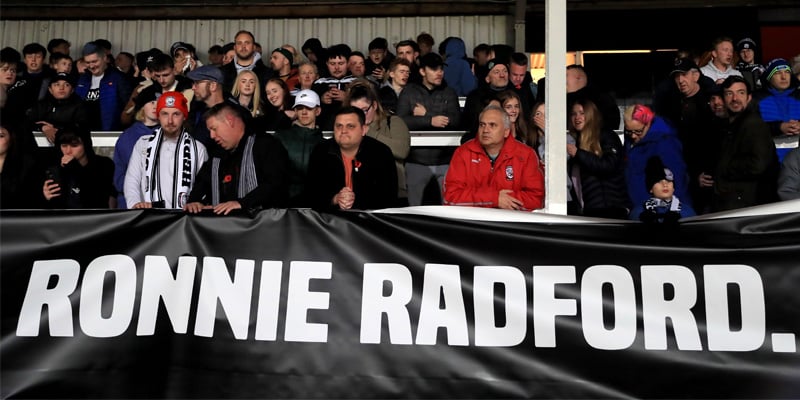
Ronnie Radford celebrates his wonder goal for Hereford against Newcastle as supporters invade the Edgar Street pitch. Alamy
From John Motson’s commentary to a parka-clad pitch invasion, Ronnie Radford’s strike for Hereford against Newcastle will live on as the ultimate FA Cup upset
By David Stubbs
9 January 2023
For certain of us, that 35-yard screamer by Ronnie Radford, who died aged 79 on November 2, is as great, as valuable as any ever scored – Pelé 1970, Maradona 1976, Hurst 1966. It was the birth of something new, today a reminder of something lost.
There had been FA Cup giantkillings before 1972, naturally – in 1933, all-mighty Arsenal were humbled and outmuscled by Walsall. In 1959, Liverpool lost 2-1 to Worcester City of the Southern League. In 1971, only the season before, Fourth Division Colchester added to the gaiety of the nation by dumping much-unloved Leeds out of the Cup.
And yet, as perfunctory histories of FA Cup upsets attest, non-League Hereford’s 2-1 victory in the third round replay over Newcastle is the Year Zero of giantkillings. Colchester v Leeds belongs to some obscure pre-history. In part, this is down to John Motson’s commentary. This aspect of the TV coverage has enabled the Radford goal to connect so fondly with, for example, Football Focus presenters unborn in 1972 but for whom the clip is seared on their memory thanks to it having been recycled on an annual basis, as well as that slew of nostalgia shows (remember them?) of the Noughties.

Ronnie Radford (left) and Ricky George celebrate the famous win over Newcastle. Alamy
This was the Birth of Motson, who had found the ideal match to launch the urgent, frantic tone he brought to bear in his commentaries. Youthful naivety, wide-eyed like a small boy watching his first ever football match. “Look at that!” He lacked the more adult, stentorian tones of a Huw Johns, the schoolmasterly dear-oh-dearness of a Barry Davies. His commentary was noise, really, rather than particularly well-wrought verbal content but it conveyed the series of mounting crests of excitement of any given match, which is much more conductive to the TV match-watching experience than any amount of shrewd tactical analysis. “Villa! Still Ricky Villa!” Or, simply, in the semi-final of the 1984 European Championship, a net-bursting shriek of “Goal!” when Michel Platini struck France’s extra-time winner.
Watching the highlights of the match, what also strikes is how much Hereford 1972 was about the crowd. As close to the action as a Top of the Pops audience to the stars, only considerably more animated, their expressions of hope, elation, scorn, of living in and loving the moment, are a tableau. Doubtless those rows and rows of kids have subsequently picked out and freeze-framed their younger selves on YouTube. And why not. Turned out in vast, uncontainable numbers to the tiny Edgar Street ground, teeming on the terraces, up trees or on floodlight pylons, they make this, the way the hysterical crowds make those early Beatles concerts. It’s them who really matter.
Ah, the kids. The parkas. I would have been a parka kid myself, thrilling to the spangled but proletarian stomp of glam rock. Not that they would have dreamt of getting themselves up like Slade’s Dave Hill or the Sweet’s Steve Priest, any more than they would dream of wearing their club football shirts to matches. They wore parkas but certainly weren’t mods, and were scornful of their prog rock older brothers in their greatcoats. They were the kids, and they would have their day in the mud.

Hereford fans pay tribute to Radford at this season’s FA Cup tie against Portsmouth. Alamy
The mud is a vital, lost component of 1972. It speaks to the relative equality and opportunity of 1970s football, indicative of the wider relative equality and opportunity of British life, despite the supposed “doldrums” of that decade. That bobbled, muddy surface from which Radford let fly left just that bit to chance that something like this could happen. An immaculate baize of perma-inevitability had yet to descend on the game. It precipitated the greatest ever pitch invasion, a veritable teenage rampage, with a handful of middle-aged cops in overcoats wandering helplessly around, jerking their thumbs in the direction of the stands.
Pity Newcastle, the mutton-chopped Malcolm Macdonald in particular, stomping around invidiously, put off his stroke by the jeering, highly proximate gauntlet of home fans. When he scored, he was like a man who had slain a small but irritating demon. But it was not to be. Glory to Hereford, to Radford, and then the oft-forgotten Ricky George, scorer of the winning goal. Glory, but not riches – Radford returned to his native north and his trade as a joiner, before a growing cult of nostalgia drew him back to the club. Imagine, though, not only having that goal in your display cabinet of memories but to know that fans of his own generation and those unborn have it in theirs too.
This article first appeared in WSC 427, January 2023. Subscribers get free access to the complete WSC digital archive
Want to see your writing published in WSC? Take a look at our pitching guide and get in touch
Tags: FA Cup, Hereford United, Newcastle United, Ronnie Radford
